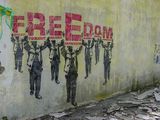
2010-07-01
PHOTOS: Thousands rally to denounce police brutality in Toronto
by Maya Rolbin-Ghanie
On Monday, one day after the G20 summit came to a close, thousands of people rallied outside of Toronto’s police headquarters at College and Yonge to stand in solidarity with the more than 900 people who were rounded up and arrested over the course of the weekend, and to loudly denounce the brutality which police employed in the process.
Police stood on the steps of their HQ, idly chatting, chuckling, and watching the crowd. Police stood on the roof of the HQ snapping photos of the crowd. A police line separated the people from the building. Riot cops were close by, ready to spring should the need arise.

Many there were not habitual protesters. Others had never been to a rally before in their lives. Most people seemed to have been shocked into coming out. Most of the 900 arrestees likely had several people show up to show support.
People carried signs demanding that Bill Blair, chief of police resign immediately, or signs indicating which of people’s constitutional rights had been violated.
Speakers led people in numerous chants, including “Shame!” and “Let them go!”
Prominent writer and activist Judy Rebick led folks in chanting “We will not shut the fuck up!” while Deborah Cowen, a professor of geography and urban planning took note of the sorts of abuses suffered in Toronto at the hands of the police and politicians, as well as in the rest of the world, and aptly stated:
“Toronto is a microcosm of the G8/G20 policies.”
Just as many of the policies pushed through and made to pass at the G20 summit will abuse, disenfranchise, and cause injury or death to people living in poverty, indigenous people, and many others the globe over, poor and marginalized communities in Toronto are subject to a paralell, if similar dynamic.
This dynamic, which is in play whether or not a summit is occurring in the city, becomes heightened in its apparence when a summit does occur, and when 900 + activists and passersby are illegally arrested abused, and denied their rights.
Many of those arrested were not used to such treatment. Some were. Many were shocked by the brutality of the state. Some were not. Many arrested possess journalism and social networking skills, and have managed to get the word out in spite of the corporate media’s posturing. This may in part be attributed to the beating and arrestation of mainstream journalists as well as independent ones. Nothing teaches people like first-hand experience, and they bring their experiences back to wherever it is they are going.
Queer rights, migrant rights, women’s rights and “citizen’s” rights were all blatantly violated throughout the course of the protests, and in detainees’ interactions with police, both in and out of the detention centre, much as in countries affected by the G20 policies. In detention, accounts of racist remarks, sexual assault and harassment, solitary confinement for queer people, and denied access to food, water, warmth, phone calls or legal counsel were all reported by detainees.
The rally itself was empowered and empowering. When it came to an end, organizers asked people to “leave together,” beginning what turned into a three hour march through the city, which visited several sites of the most severe police violence that weekend, including Queen’s Park, the “free speech zone” where police launched an attack and mass arrest on peaceful protesters two days earlier. There was a sense of radical reclamation in it.